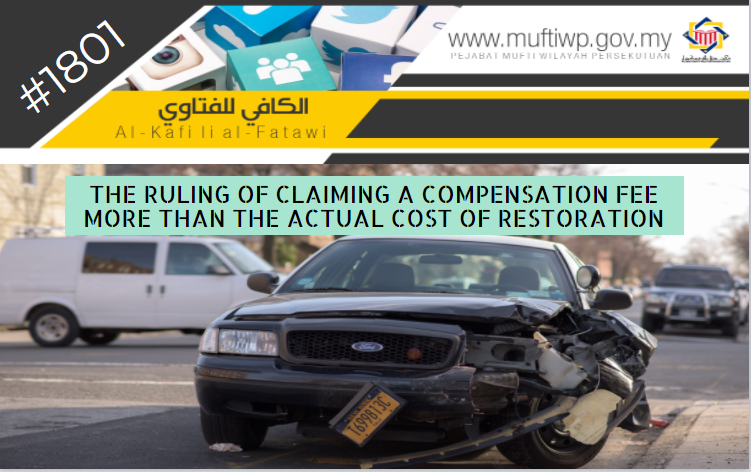
Question:
Salam sir. I have a question. I borrowed a van owned by my late uncle from his son to do a rental business. Unfortunately, the van was involved in an accident. I demand RM200 as a compensation fee from the renter. I already bought and restored the new headlamp, with a total cost of RM90. My question is, the remainder of RM110 belongs to my cousin or me? Hope for an explanation.
Brief Answer:
If there is excess money after the restoration is done, it is obligatory to return it back to the renter. This is because the true cause of sanctioning compensation is to lift any existed harm. If RM90 spent is enough to lift the harm, the van’s owner or his proxy has no right to claim more than that unless if the renter permits and allows it.
Explanation:
Firstly, the majority of the scholars state that an owner has no right to claim any compensation for the damage that takes place during the renting period unless the damage is caused intentionally or due to negligence. This is because a renter in the rental contract is considered an oath-taker.
So, the compensation claim is only eligible in the situation where the renter intentionally damages the item or self-neglect like speeding, crossing roads prohibited by the owner, and so on. (Refer: al-Mu’tamad fi al-Fiqh al-Syafie, 3/233-234)
Besides, there is a famous legal maxim which mentions,
الأجر والضمان لا يجتمعان
“Rental price and compensation fee shall not be grouped”
This maxim shows that the rental or service fee is not obligatory upon a person who already pays the compensation fee and vice versa. For example, a person rents a vehicle then it broke down or is involved in an accident unintentionally, he is only obliged to pay the rental fee without having to settle the damage price. (Refer: Durar al-Hukkam fi Syarh Majallah al-Ahkam, 1/89)
However, some scholars are of the opinion that the car’s owner has the right to claim a compensation fee from the renter due to damage that happened even it is done without intention or due to neglect. Among the judgments is if the matter is set as a condition during the start of the contract and the renter is willing to agree with this, so it is the obligation upon him to fulfill the agreement he made.
Imam Ahmad in one of his narration when asked whether it is permissible to put the condition of obligating the compensation fee for things which are not obligatory to be compensated:
وعن أحمدَ، أنَّه سُئِلَ عن ذلك، فقال: المُسْلِمُونَ على شُرُوطِهِم. وهذا يَدلُّ على نَفْىِ الضَّمَانِ بشَرْطِه، ووُجُوبِه بِشَرْطِه
In a narration from Ahmad, when he was asked so, he answered: “A Muslim shall hold on to the conditions he set”. This shows that whether the compensation fee is obligatory to be paid or not depends on the mutual agreement. (Refer: al-Mughni, 8/115)
Besides, Imam al-Syatibi explained in detail that maslahah and the wellbeing to be achieved shall be taken into consideration because an owner normally oversees or knows not what happened to the rented or borrowed item. Most probably because the renter or borrower takes lightly in maintaining the item. Then when something bad happens, they easily use the reason like the item is stolen, damaged, or the like. (Refer: al-I’tishom, 2/616)
In addition, many countries have the policy and regulations where a car renter shall compensate for any damage that happened whether intentionally or not.
Looking at the opinion of some scholars and the current application, the van’s owner shall claim a compensation fee, but only be entitled to the actual cost.
Imam al-Shafi’e explained that the cost of compensation shall be paid by an individual who is entitled to an item by stating:
وَإِذَا غَصَبَ رَجُلٌ مِنْ رَجُلٍ طَعَامًا حَبًّا أَوْ تَمْرًا أَوْ أُدْمًا فَاسْتَهْلَكَهُ فَعَلَيْهِ مِثْلُهُ إنْ كَانَ يُوجَدُ لَهُ مِثْلٌ بِحَالٍ مِنْ الْحَالِ وَإِنْ لَمْ يُوجَدْ لَهُ مِثْلٌ فَعَلَيْهِ قِيمَتُهُ
“If a person seizes some foods from another person whether one grain of cereal, a date, or any cooking ingredients, then he eats it, he shall pay the compensation fee by something of the same type. If he can’t find a similar replacement, he shall pay with the same value of the item.” (Refer: al-Umm, 3/259)
In conclusion, the excess money after the restoration shall neither be taken by the borrower nor the original owner of the van, but shall be returned back to the renter.
This is because the truth of sanctioning compensation is to lift any existed harm. If RM90 spent is enough to lift the harm, the van’s owner or his proxy has no right to claim more than that unless if the renter permits and allows it. This stance is taken to ensure the rights of every party are reserved and no mistreatment happens.
Wallahu a’lam.

